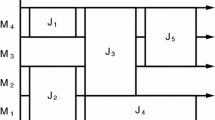Abstract
In this paper we present a scheduling strategy for workstation clusters able to effectively and fairly schedule general-purpose workloads potentially made up by compute-bound, interactive, and I/O-intensive applications, that may each be sequential, client-server, or parallel. The scheduling strategy allocates resources to processes of the same parallel applications in such a way that they all get the same CPU share regardless of the level of resource contention on the respective machines, and relies on an extended stride scheduler to fairly allocate individual workstations. A simulation analysis carried out for a variety of workloads and operational conditions shows that our strategy (a) delivers good performance to all the applications classes composing general-purpose workloads, (b) fairly allocates resources among competing applications, and (c) outperforms alternative strategies.
Similar content being viewed by others
References
C. Anglano, A performance comparison of coscheduling strategies for workstations clusters, Cluster Computing 4(2) (2001) 121–131.
C. Anglano, A comparative evaluation of implicit coscheduling strategies for networks of workstations, in: Proc. of 9th Int. Symposium 96 ANGLANO on High Performance Distributed Computing (HPDC 9) (IEEE Press, Pittsburgh, PN, August 2000).
R.H. Arpaci, A.C. Dusseau, A.M. Vahdat, L. Liu, T.E. Anderson and D.A. Patterson, The interaction of parallel and sequential workloads on a network of workstations, in: Proc. of ACM SIGMETRICS'95 (May 1995) pp. 267–278.
A.C. Arpaci-Dusseau, Implicit coscheduling: coordinated scheduling with implicit information in distributed systems, Ph.D. thesis, Computer Science Division, University of California, Berkeley (1998).
A.C. Arpaci-Dusseau and D.E. Culler, Extending proportional-share scheduling to a network of workstations, in: Proc. of Int. Conference on Parallel and Distributed Processing Techniques and Applications (PDPTA), Las Vegas, Nevada, USA (1997).
D. Bailey, T. Harris, R. Der Wigngaart, W. Saphir, W. Woo and M. Yarrow, The NAS Parallel Benchmarks 2.0, Technical Report NAS–95–010, NASA Ames Research Center (1995).
R. Buyya, High Performance Cluster Computing (Prentice-Hall, 1999).
A. Calvagna, DAVID: Distributed architecture video on demand system, Faculty of Engineering, University of Catania, http://sun195.iit. unict.it/DAVID.
A.C. Dusseau, R.H. Arpaci and D.E. Culler, Effective distributed scheduling of parallel workloads, in: Proc. of ACM SIGMETRICS'96 (1996).
A.C. Dusseau-Arpaci, D.E. Culler and A.M. Mainwaring, Scheduling with implicit information in distributed systems, in: Proc. of ACM SIGMETRICS' 98 (1998).
D.G. Feitelson and L. Rudolph, Gang scheduling performance bene-fits for fine-grained synchronization, Journal of Parallel and Distributed Computing 16(4) (1992) 306–318.
GAMMA homepage, http://www.disi.unige.it/project/gamma.
A. Gupta, A. Tucker and S. Urushibara, The impact of operating system scheduling policies and synchronization methods on the performance of parallel applications, in: Proc. of the 1991 ACM SIGMETRICS Conference (1991) pp. 120–132.
A.R. Karlin, M.S.Manasse, L.A.McGeoch and S. Owicki, Competitive randomized algorithms for nonuniform problems, Algorithmica 11(6) (June 1994) 542–571.
R. Mukherjee, A scalable and highly available clustered web server, in: High Performance Cluster Computing, ed. R. Buyya (Prentice-Hall, 1999) ch. 36, pp. 811–840.
S. Nagar, A. Banerjee, A. Sivasubramaniam and C.R. Das, Alternatives to coscheduling a network of workstations, Journal of Parallel and Distributed Computing 59(2) (1999) 302–327.
F. Petrini and W. Feng, Time-sharing parallel jobs in the presence of multiple resource requirements, in: Proc. of IPDPS 2000 Workshop on Job Scheduling Strategies for Parallel Processing, Cancun, Mexico (Springer, 2000).
P.G. Sobalvarro, S. Pakin, W.E. Weihl and A.A. Chien, Dynamic coscheduling on workstation clusters, in: Proc. of IPPS' 98 Workshop on Job Scheduling Strategies for Parallel Processing, Lecture Notes in Computer Science, Vol. 1459 (Springer, 1998).
C.A. Waldspurger, Lottery and stride scheduling: Flexible proportional-share resource management, Ph.D. thesis, M.I.T. (1995).
Author information
Authors and Affiliations
Rights and permissions
About this article
Cite this article
Anglano, C. Fair Scheduling of General-Purpose Workloads on Workstation Clusters. Cluster Computing 5, 87–96 (2002). https://doi.org/10.1023/A:1012752923793
Issue Date:
DOI: https://doi.org/10.1023/A:1012752923793




